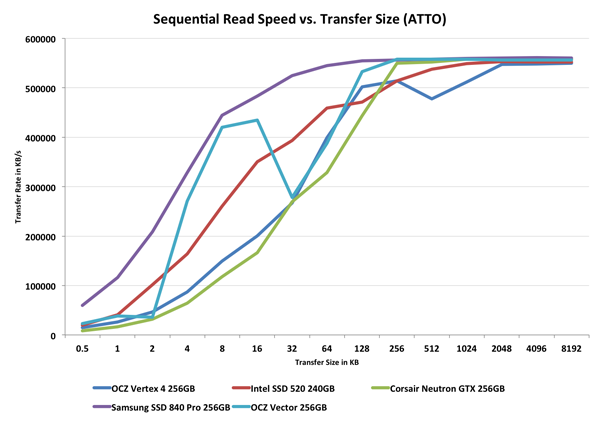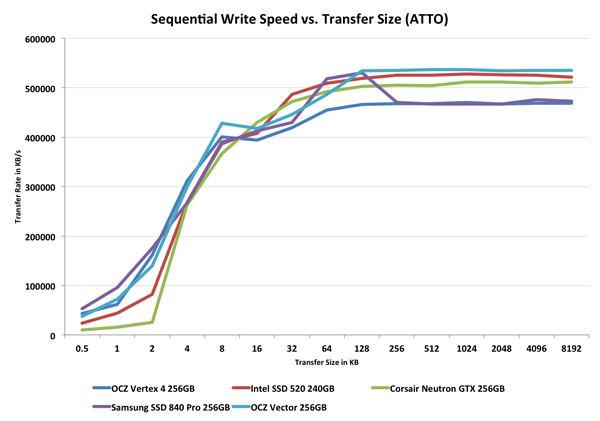OCZ Vector (256GB) Review
by Anand Lal Shimpi on November 27, 2012 9:10 PM ESTPerformance vs. Transfer Size
ATTO does a good job of showing us how sequential performance varies with transfer size. Most controllers optimize for commonly seen transfer sizes and neglect the rest. The optimization around 4KB, 8KB and 128KB transfers makes sense given that's what most workloads are bound by, but it's always important to understand how a drive performs across the entire gamut.
Vector clearly attempts to shift the Vertex 4's performance curve up and towards that of Samsung's SSD 840 Pro. There's a fairly repeatable anomaly at 32KB and 64KB where performance drops down to Vertex 4 levels, but generally speaking there's a tangible improvement across the board. My guess is whatever is happening at 32KB and 64KB is a bug though. Barefoot 3 has no issues parallelizing workloads that are smaller.
I would still like to see improved 512B transfer performance, but other than Samsung it doesn't look like anyone is really focusing on smaller-than-4KB performance anymore. Even Intel has pretty much abandoned focusing on it with its S3700 controller. I may just have to give up caring about it. Smaller than 4KB performance really doesn't impact most client workloads, it's really the weird corner cases where it would matter. Just don't go off and use any of these drives under Windows XP and you'll be fine.
When it comes to write performance, OCZ has delivered a solution that seems to be a hair quicker than the 840 Pro in many of the smaller transfer sizes, and a lot faster once we get to the larger block sizes. Performance vs. the Vertex 4 is clearly improved, and there's only a mild indication of whatever weird issue was happening in the read test.












151 Comments
View All Comments
rob.laur - Monday, December 3, 2012 - link
the 840 Pro has terrible recovery when pushed hard.http://www.tomshardware.com/reviews/vector-ssd-rev...
jwilliams4200 - Tuesday, December 4, 2012 - link
I certainly would not call it "terrible" -- it actually looks pretty good to me. And if you want even better performance under sustained heavy workloads, just overprovision the SSD.dj christian - Monday, February 4, 2013 - link
How do you overprovision the SSD?somebody997 - Thursday, April 11, 2013 - link
You don't. Most SSDs will come in 128, 256 or 512 GB sizes. If you have an SSD and you see a decrease in size, usually at 120, 240 or 480 GB sizes, it means the controller has already over provisioned the SSD for you.batguiide - Sunday, December 9, 2012 - link
Thanks for these tips!share a website with you :socanpower,ca,You will love it! I believe!
jdtwoseven - Monday, December 10, 2012 - link
I have WAY too much scar tissue from this vendor to ever buy their products again. I bought five of their SSDs, and was five for five RMAing them back. I have the replacements, but don't trust them enough to use them in anything other than evaulation work because them are just not dependable. I would avoid them like the plague.somebody997 - Thursday, April 11, 2013 - link
I have had multiple SSDs from OCZ, and none of them have failed up till today. I boot Mac OS X from my OCZ Vector, and from every OCZ SSD before that. In my experience, it's not the OCZ SSDs that have terrible reliability, it's Windows. Besides, have any of you guys complaining about OCZ SSDs ever tried turning off automatic disk defragmentation in Windows?Windows has an automated disk defragmenting tool to defragment HDDs, but when you plug in an SSD, the tool is automatically disabled.
Chances are, those of you with SSD problems have a PC with windows that did not successfully disable automated disk defragmentation, and have had your SSDs killed due to that.
Mac OS X does not have an automated disk defragmenting tool as it generally tries not to write in fragments. Without the automated defragmentation tool, my OCZ SSDs have never failed.
ewh - Tuesday, April 30, 2013 - link
My Vector 256 drive completely failed in just under 4 months. OCZ is going to replace it but if the replacement fails in less than 48 months I will look for alternatives.jhboston - Wednesday, May 8, 2013 - link
My OCZ VTR1-25SAT3-512G failed after just 33 days. This was 3 days after the vendors replacement agreement expired. Has to go to OCZ, OCZ is replacing the drive, but they are following a delayed time frame to get the new drive in my hands.djy2000 - Wednesday, July 31, 2013 - link
Ok my OCZ vector catastrophically failed within 3 months :-( Think I'll be going with intel or samsung next